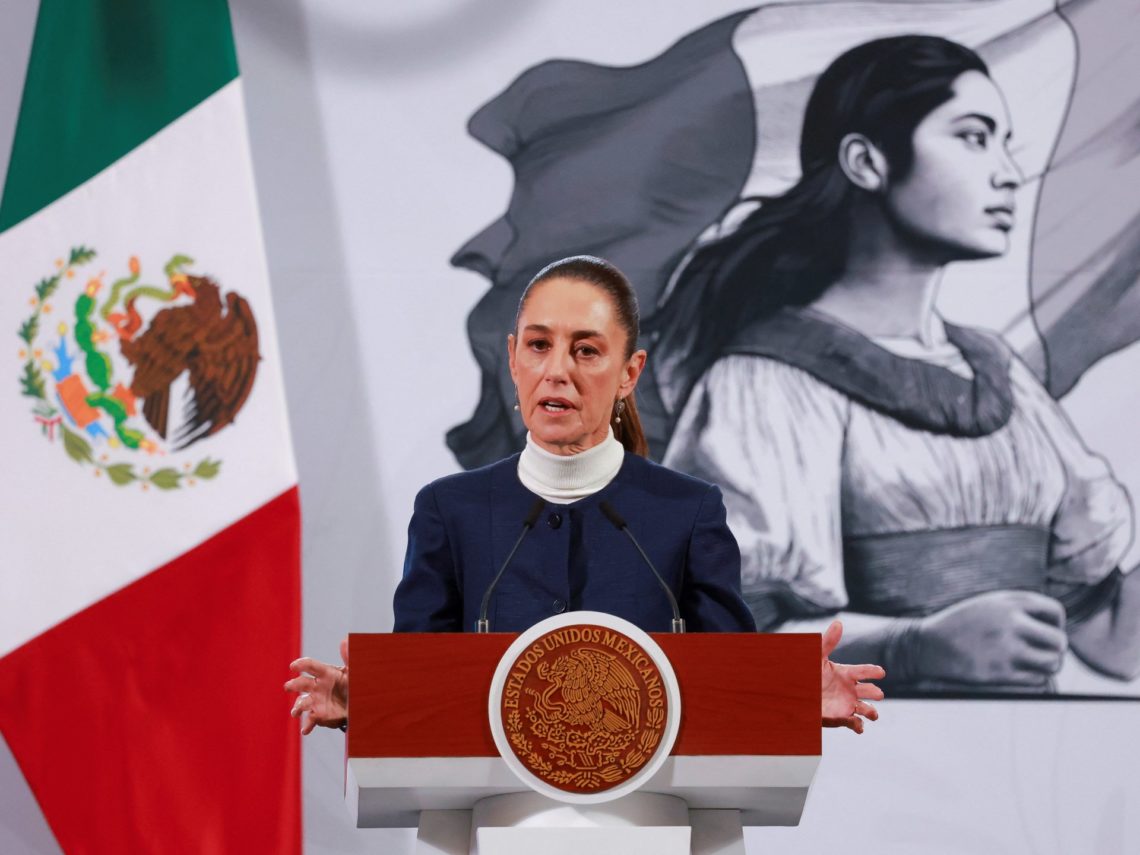Monterrey, Mexico – Juan Alvarado has owned a small shoe manufacturing business in Leon, Guanajuato, Mexico’s shoe manufacturing capital, for more than 15 years. But the current trade and political tensions in US-Mexico relations, coupled with tariff-related disruptions, are forcing him to consider diversifying into other sectors or simply shutting down his business.
Alvarado told Al Jazeera that he would typically employ up to 25 people, but he’s had to cut that down to 15 now. “You’re against a wall and you can’t hold on either way. And it all depends on investment.”
Mexico’s tariff rate is being negotiated, after President Claudia Sheinbaum and United States President Donald Trump agreed to a 90-day extension, which is set to expire on October 31. Mexico continues to face a 25 percent tariff on cars and a 50 percent tariff on steel, aluminium, and copper, and 25 percent on anything not covered under the 2020 free trade US-Mexico-Canada Agreement (USMCA).
For Mexican industries like footwear, which has faced declining competitiveness against Asian countries for decades, the tariffs the US has imposed on other nations are seen as an advantage for gaining a stronger foothold with Mexico’s top trading partner.
Juan Carlos Cashat Usabiaga, president of the Chamber of the Footwear Industry of the State of Guanajuato (CICEG), is aware of the volatility US tariffs bring to business, but says that, for now, Mexico is being favoured since some of its exports are covered by USMCA.
“I truly believe these tariffs being imposed on other countries are actually an advantage,” he told Al Jazeera. “Speaking exclusively of footwear, you can still export to the United States while complying with the USMCA rules. That is, if you comply, you have zero percent tariffs. So this really makes our country very competitive compared to other nations that face tariffs of 20, 30, 40, or 50 percent.”
Trump’s tariffs, aimed at boosting US domestic industry, have created ripple effects. While some in Mexico see these disruptions as a window of opportunity, small business owners like Alvarado say that the current geopolitical landscape and inflation are endangering their investments.
Alvarado’s business used to manufacture shoes for a company that exports to the US. However, despite USMCA, demand has dropped on account of tariff uncertainty, causing the company to halt all orders from Alvarado.
“Production is currently halted. They were making 7,000 pair of shoes” [per week], of which Alvarado was supplying around 2,000 pairs, he said. “That was truly helping my business. [But] now they are making 800, 700 pairs.”
Apart from manufacturing for larger companies, Alvarado, in recent years, had also been growing a new sales channel by mailing shoes directly to US customers. This also stopped after Mexico suspended package shipments in the wake of the US government’s decision to end the “de minimis” exemption that allowed packages worth less than $800 to enter the US tariff-free.
China imports
Mexico ranks as the world’s ninth-largest footwear producer, with more than 75 percent of its production concentrated in Guanajuato. Cashat says the industry has been severely affected by Chinese imports and dumping practices.
“We’ve seen a brutal drop in production and jobs, impacting the industry’s GDP,” Cashat stated.
Last year, Mexico produced 214 million pairs of shoes. By the end of August this year, production had reached 134 million pairs, according to CICEG, based on data from Mexico’s national statistics agency. The number of workers in the industry, too, shrank to 96,929 people by the end of August, down 4,411 from a year ago.
The Mexican government recently restricted the use of the IMMEX programme, launched in 2006 for the temporary import of materials intended for re-export after processing. For decades, the misuse of the programme to import finished goods, particularly footwear and textiles from China, not only caused unfair competition and tax evasion by Mexican businesses, but in the process also decimated the local industry.
Marcelo Ebrard, Mexico’s economy secretary, reported that between 2019 and 2024, shoe production saw a 12.8 percent decline, largely due to companies’ improper use of the IMMEX programme. According to Ebrard, the temporary pause on imports of finished shoes aims to boost national production, combat contraband, and protect the jobs of 130,000 direct workers and many more indirect employees.
Mexico also announced plans to set its own tariffs on certain imports from countries like China, with which it does not have free trade agreements. These measures are part of Plan Mexico, a national strategy designed to promote economic growth and strengthen the country’s role in global value chains.
For Luis Rodriguez Tirado, CEO of Hormas El Arbol, a company that has been producing shoes for the last 90 years, these tariffs and the pause of IMMEX are significant incentives for the industry to compete on a level playing field.
“We can compete with any other country. If they still beat us, I’m fine with that, but only on equal terms,” he said.
However, some analysts view these measures merely as a response to the strong pressure Washington, DC has exerted on the Mexican government, rather than as a genuine effort to crack down on illicit imports.
Workers in Mexico’s large informal sector rely heavily on cheap Chinese products to sustain their businesses and earn a living.
Renato Balderrama, a professor at the Center for Economic Research and Teaching (CIDE), pointed out that goods like footwear and textiles often enter illegally, and he believes it is difficult for any government to “clean up customs”, despite good intentions.
“We have an informal economy that accounts for half of Mexico’s economy. So, if you block that income, people either starve or sell drugs,” he added.
Balderrama added that Mexico is in urgent need of diversifying its exports, particularly toward Asia.
“The markets that have grown the most and will continue to grow are those in the Pacific Rim and South Asia. And this is precisely when we are cutting ties [with China] and becoming more dependent on the United States.”
Made in Mexico
Alvarado, the shoe manufacturer, defines Chinese imports as a “cancer” that has been plaguing the industry. However, he also believes that small business owners face increased difficulty navigating these challenging times due to both a lack of financial support and the involved governmental bureaucracy.
Experts and industry insiders agree that Plan Mexico sounds promising on paper, but financial support and an integral implementation are key to its success.
“The strategy has yet to be fully realised” and must be assigned the necessary resources for the massive task ahead, Balderrama told Al Jazeera.
But when it comes to the footwear industry, it is not necessary to start from zero, but rather to implement an integral plan to recover what has been lost in recent years, Cashat said. “It’s an industry that has much to offer. Today, companies are operating at just over half their production capacity, around 55 percent,” he added.
Rodriguez agrees that despite the Mexican government’s recent measures, the footwear industry must be restructured. Organising and strengthening small and medium-sized businesses, and addressing the informal sector should be the priorities, including helping them access new technologies and industrial technification.
“It would be necessary to include those informal businesses that are being evaluated so they can become formal and can have access to better funding and planning,” he said.
A year and a half ago, Alvarado’s business was robbed. Guanajuato faces significant security challenges due to the presence of organised crime and gang activity. Micro and small enterprises face theft, extortion, and reduced sales because of these concerns. He applied for government support for microbusinesses, but after seeing that the application process would take over a year, he had to take out a bank loan to recover and continue functioning.
“To maintain a team of workers, they need a salary every week. If not, people leave, and it’s harder to maintain a team,” he said. “To keep working, I had to go into debt with the bank.”
The post Mexico’s footwear industry could benefit from US tariffs. But it’s not appeared first on Al Jazeera.




